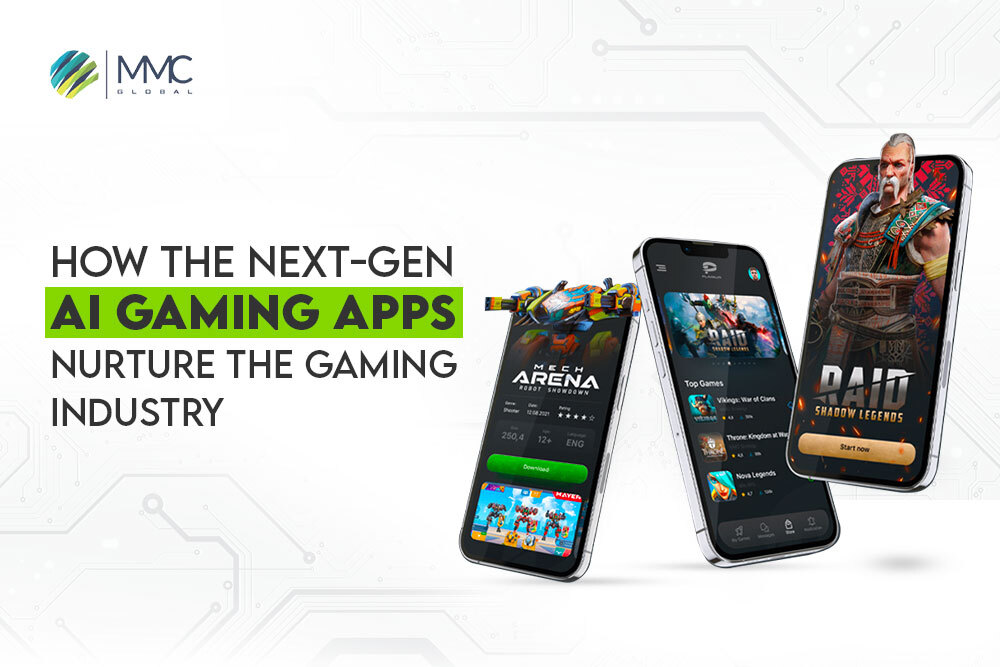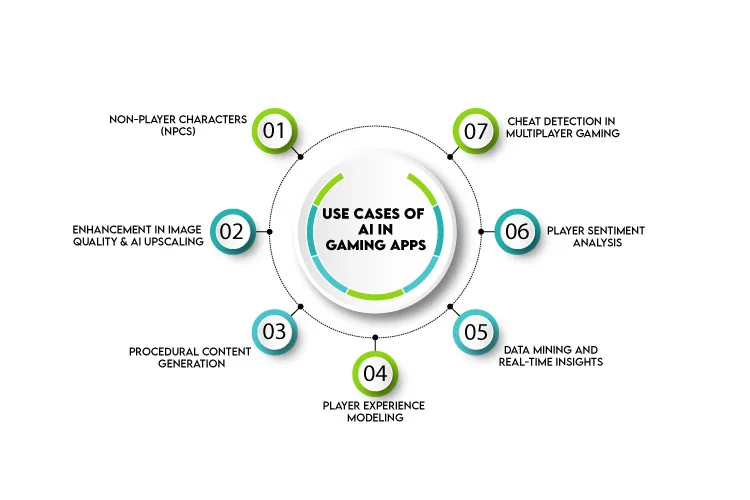How The Next-Gen AI Gaming Apps Nurture the Gaming Industry


The morphoses of the gaming industry bring an immersive experience of the virtual world. The infusion of technologies like augmented reality and virtual reality allows gamers to experience real-world experiences while playing games. But the world is now more transforming with AI technology, and we all witness this in our daily business lives. Hello to the world of AI gaming apps where objects look real, and the action gets personalized!
The use case of AI in gaming apps is now making waves in the gaming industry. A report says that 61% of surveyed game developers used AI to create player-related elements in video games. The Pandemic brings wholesome opportunities to the gaming industry due to the excessive degree of online gaming activities. People were likelier to use social media, play games, make friends, etc.
The rising use of AI gaming apps helps deliver exceptional player experience, adaptive gameplay, realistic non-player characteristics, procedural content generation, data mining, and much more.
Let’s get an in-depth look into it!
What is an AI Gaming App?
The infusion of AI technology in the gaming app development process refers to AI gaming apps that create more dynamic, responsive, and immersive gaming experiences. The delivery of the AI experience should not be obvious; it must look genuine, and that is the beauty of AI professionals who lift the game!
Considering developing a game that sets new trends in the gaming world, the association of artificial intelligence is a must. Moreover, AI use cases in gaming apps are life-like elements like characters, gaming advice, objects, etc. Along with AI, its subsets like machine learning and deep learning create buzz.
Use Cases of AI In Gaming Apps
The core concept of artificial intelligence in AI gaming apps is to make gaming more realistic and challenging, making players curious about the next level. Let’s evaluate what AI gaming app features we can build with AI algorithms and techniques.

Non-Player Characters (NPCs)
The prominent feature of AI gaming app development is it consists of non-player characters (NPCs). A non-player character (NPC) refers to a term in the context of video games and tabletop role-playing games (RPGs). An NPC is a character within the game world who is not controlled by a human player but is instead controlled by the game’s programming. Or, in the case of tabletop RPGs, the game master (or dungeon master) is responsible for creating and managing the game’s world.
NPCs are controlled by artificial intelligence (AI) routines or scripts. These routines determine their behavior, interactions, and responses to the player’s actions. Some NPCs may follow predetermined paths, while others may have more complex decision-making capabilities.
Enhancement in Image Quality & AI Upscaling
The looks matter, and the gaming industry takes this seriously. AI gaming apps look more appealing and thrilling when you deliver a quality user interface. To make this happen, here comes AI upscaling! This feature of AI gaming apps turns low-resolution images into high resolutions, which is certainly a next-gen experience for the players.
From playing a classic version to entering a vivid crystalized screen resolution, the gaming industry geared up to generate more revenues than ever before. For instance, in a video game, image enhancement might involve applying anti-aliasing or high-dynamic-range (HDR) rendering to make the graphics look more realistic and attractive. At the same time, AI upscaling helps increase the resolution of textures on characters or objects, resulting in crisper and more detailed in-game visuals without requiring developers to create higher-resolution assets for every element in the game manually. This can lead to better graphics quality and more immersive gaming experiences.
Procedural Content Generation
The noise of generative AI is too loud this year as of launching ChatGTP and other AI-based textual and graphical tools. PCG in AI gaming apps is a technique where content, such as levels, maps, items, or characters, is generated algorithmically by a computer rather than manually designed by developers. It allows for the creation of vast and dynamic game worlds. Moreover, to make the gaming experience more personalized, the user-generated text can also level up the game’s personality.
For example, in the game “Minecraft,” PCG is used to create the entire game world. It generated endless landscapes with diverse terrain, caves, resources, and structures. Each time a player starts a new world, the terrain and features are procedurally generated, offering a unique and ever-changing experience. This approach reduces the need for hand-crafted content and can result in more replayability and variety in games.
Player Experience Modeling
Player-experience modeling (PEM) is a game design and development technique to predict and shape players’ emotional and cognitive responses as they interact with a game. The best yet most mesmerizing AI gaming app experience is to analyze the intellectuality and smartness of playing games. It helps determine individual capabilities, interests, and game preferences.
Furthermore, it helps to adjust the gaming mechanism by analyzing player behaviors through AI algorithms and techniques. The game has the built-in ability to increase and decrease complexity in real-time and according to the player’s likes and dislikes.
Data mining and Real-Time Insights
Keeping an enormous amount of data in this crowded gaming industry is very challenging. However, AI gaming apps make analyzing player performance metrics, behavior, in-game transactions, and gaming competency levels simple yet effective. It allows developers to build effective monetization strategies, game user interface designs, and further escalation of game levels.
Read more: 7 Best Augmented Reality Games That You Need To Check Out Right Now!
If you need to run a campaign on social media like Candy Crush, you can also target your intended audience by specifying personas. Moreover, these insights help to make informed decisions to optimize the game experience and make instant adjustments.
Player Sentiment Analysis
AI is now more capable of judging the sentiments of humans by its actions. In AI gaming apps, AI sentiment analysis works over the player reviews, feedback, gadget selections, and other valuable insights. In fact, it allows AI gaming apps to provide real-time recommendations, tips, and feedback on a particular level after each gaming session.
A few times back, Blizzard Entertainment developed a popular game, “Overwatch”, which is a great example of AI sentiment analysis. The game utilizes AI sentiment analysis to moderate in-game chat and voice communications. The AI analyzes players’ text and voice messages to detect and filter out toxic or offensive language. It assesses the sentiment of the messages and identifies those that may be inappropriate or abusive, issuing warnings or penalties to offending players.
Cheat Detection in Multiplayer Gaming
AI is popular for strong security and cyber attack detection. Similarly, AI algorithms have been infused into AI gaming apps to detect cheating and any unusual activity that violates game rules. Cheat detection in multiplayer gaming with AI involves using artificial intelligence to identify and prevent unfair advantages or unauthorized activities in online games. AI-driven cheat detection systems analyze player behavior and in-game data to flag suspicious activities such as aimbots, wallhacks, or other forms of cheating.
The Upcoming AI Gaming Apps Trends
AI is emerging, and it is unstoppable to gain traction by making every possible effort to do things in gaming. The future of AI gaming apps depends on more optimized and advanced technology like Generative AI, Cloud-based gaming, Blockchain and NFT, AR/VR, Metaverse, and a long way to GO!
Read more: From Concept to Reality – How an AI Development Company Brings Your AI Ideas to Life
However, the ever-evolving technologies obsolete traditional gaming, turning them into video gaming series with high-resolution displays and interactive storylines. Developers find challenging ways to match their products up to the market competency. Among online users aged 16 to 24 years, battle royale games were the sole gaming genre to feature prominently, while older age groups additionally engaged in online board games (Statista).
Moreover, developing gaming apps requires some ethical considerations in mind. You have to be very careful about the player’s data privacy. AI is about learning with human activities, user data information, and real-time responses. There is a high risk of privacy evasion. To eliminate this, you have to implement security measures.
Another turn out ethical consideration of AI-powered gaming apps is game addiction. The game is supposed to be not addictive, which leads to disturbing the player’s life. Developers should enforce precaution messages when the time limit is unusually excessive and suggest breaks to reduce screen time.
The AI gaming app is expanding, and there is a long way to go. From designing applications to development and from deployment to building effective strategies, everything you can get under one roof with us. Let’s make your next million-dollar AI gaming app with professionals!



